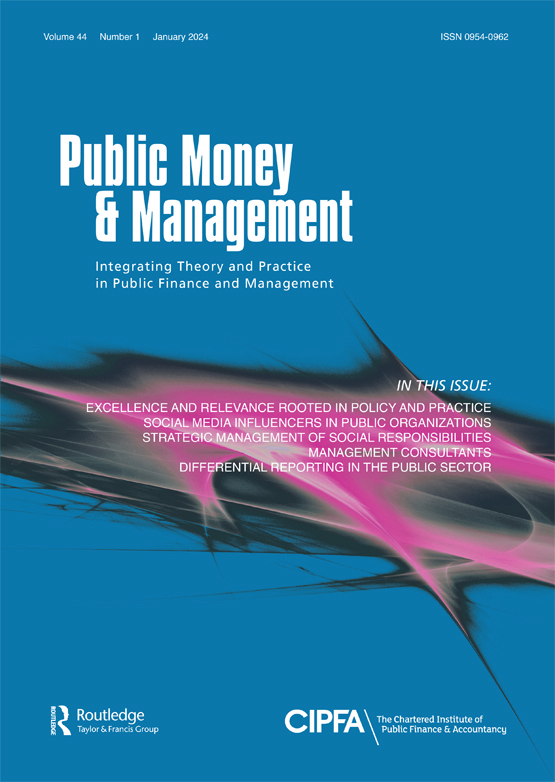Submit a Manuscript to the Journal
Public Money & Management
For a Special Issue on
New directions in politicians’ use of accounting information
Manuscript deadline
01 July 2024

Special Issue Editor(s)
Tjerk Budding,
Vrije Universiteit Amsterdam, The Netherlands
[email protected]
Jan van Helden,
University of Groningen, The Netherlands
[email protected]
New directions in politicians’ use of accounting information
As a continuation and further deepening of our knowledge of two earlier PMM theme issues, one published in 2016 and the second in 2022, we call for contributions for a new theme issue, to be published at the end of 2024. The PMM theme published in 2016 discussed both the stimuli and obstacles for accounting information use by politicians (doi.org/10.1080/09540962.2016.1237110). The 2022 theme focused on the relevance and understandability of accounting information for politicians. At a conceptual level, the 2022 theme made a distinction between the antecedents of the provision of accounting information and the antecedents of accounting information use (doi.org/10.1080/09540962.2022.2028467). See also PMM’s Vol. 42, No. 8 which includes six follow-up debate articles.
The term ‘accounting information’ is understood in a broad sense. It covers financial information and performance information; it can be related to the annual budgeting cycle but also to specific programmes or projects; and it can be presented ex ante in budgets or ex post in reports. Politicians are members of the legislature, such as members of parliament or council members in a municipality, as well as members of the executive, such as ministers and members of the executive committee of a municipality. These politicians often rely on their staff for the provision of accounting information, which gives rise to an interesting theme about the interactions between users and providers of accounting information. Providers of accounting information can be further extended to auditing institutions and information brokers as intermediaries between providers and users of accounting information.
We now want to examine two new issues relating to the use of accounting information by politicians. The first is the way non-financial information is included in budgets and annual reports. This information used to be focused on the performance (to be) accomplished with the financial means. Now there is a trend to include information on environmental, social and governance issues. Labels are being used, such as ‘sustainability reporting’, ‘integrated reporting’ or ‘ESG reporting’. Whereas several new elements are now additionally reported (for example about carbon emission and welfare), little is known about how politicians use this information and to which extent it actually influences political decisions. Furthermore, as many governments seem to adopt a standard framework (such as the Sustainable Development Goals launched by the United Nations) for implementing these reforms, an open question is to what extent the newly reported items fulfil the information needs of politicians in a specific context.
Our second issue is the interface between providers and users of accounting information—in particular, how this interface can be shaped in order optimise the use of this information. Several more specific issues are at stake:
- Do providers have enough knowledge about the needs of the users of accounting information in the full timeframe of the decision-making processes, such as agenda-setting, planning, budgeting and accountability?
- Which forms of co-creation of accounting information by providers and political users can strengthen the alignment of user needs with provided accounting information?
- Which types of phasing of accounting information provision—such as setting boundaries and providing guidelines, followed by elaborated budgets and budgetary reports—can contribute to an effective use of accounting information in the political arena?
- How can intermediaries (brokers) of accounting information, like budget offices or budgetary committees, enhance the accessibility of accounting information for laymen-politicians, and how do we make sure that these intermediaries are not setting their own agendas?
The issues above are not meant to constrain submissions on other issues related to accounting information use by politicians. We want interested scholars to submit articles with an innovative stance to the theme at hand, both in terms of research goals and related research questions, as well as methods and theories. We especially welcome articles on topics that were not or were only slightly addressed in the previous PMM themes. Of special interest are articles that contribute to an improved provision and use of accounting information in the political arena—PMM focuses on articles with a strong impact for practice.
Looking to Publish your Research?
Find out how to publish your research open access with Taylor & Francis Group.
Choose open accessSubmission Instructions
PMM publishes research articles, new development articles and debate articles—see the journal’s instructions for authors: https://www.tandfonline.com/journals/rpmm20
Interested researchers are invited to submit articles for consideration via PMM’s online submission portal, https://mc.manuscriptcentral.com/rpmm, by 1 July 2024. Research articles will be double-blind refereed by two reviewers. Articles submitted to PMM for review must not be under consideration by any other publication outlet. The guest editors are happy to provide further information. They can be contacted via email: Tjerk Budding ([email protected]) and Jan van Helden ([email protected]).